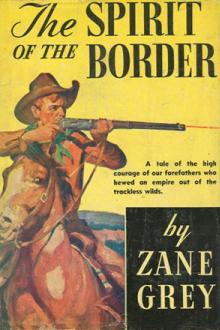The U. P. Trail, Zane Grey [robert munsch read aloud .txt] 📗

- Author: Zane Grey
Book online «The U. P. Trail, Zane Grey [robert munsch read aloud .txt] 📗». Author Zane Grey
“This is my cowboy friend, Larry Red King,” said Neale. “He was with me when I—I found you.”
“Larry—Red—King,” murmured the girl. “My name is—Allie.”
Again Neale had penetrated into her close-locked mind. What she said astounded him so that he dropped the brush and stared at Larry. And Larry lost his grin; he caught a glimpse of her face, and his own grew troubled.
“Allie—I shore—am glad to meet you,” he said, and there was more feeling in his voice than Neale had ever before heard. Larry was not slow of comprehension. He began to talk in his drawling way. Neale heard him with a smile he tried to hide, but he liked Larry the better for his simplicity. This gun-throwing cowboy had a big heart.
Larry, however, did not linger for long. His attempts to get the girl to talk grew weaker and ended; then, after another glance at the tragic, wan face he got up and thoughtfully slouched away.
“So your name is Allie,” said Neale. “Well, Allie what?”
She did not respond to one out of a hundred questions, and this query found no lodgment in her mind.
“Will you braid your hair now?” he asked.
The answer was the low and monotonous negative, but, nevertheless, her hands sought her hair and parted it, and began to braid it mechanically. This encouraged Neale more than anything else; it showed him that there were habits of mind into which he could turn her. Finally he got her to walk along the brook and also to eat and drink.
At the end of that day he was more exhausted than he would have been after a hard climb. Yet he was encouraged to think that he could get some kind of passive unconscious obedience from her.
“Reckon you’d better stay over to-morrow,” suggested Slingerland. His concern for the girl could not have been greater had she been his own daughter. “Allie—thet was her name, you said. Wal, it’s pretty an’ easy to say.”
Next day Allie showed an almost imperceptible improvement. It might have been Neale’s imagination leading him to believe that there were really grounds for hope. The trapper and the cowboy could not get any response from her, but there was certain proof that he could. The conviction moved him to deep emotion.
An hour before sunset Neale decided to depart, and told Larry to get the horses. Then he went to Allie, undecided what to say, feeling that he must have tortured her this day with his ceaseless importunities. How small the chance that he might again awaken the springs of life interest. Yet the desire was strong within him to try.
“Allie.” He repeated her name before she heard him. Then she looked up. The depths—the tragic lonesomeness—of her eyes—haunted Neale.
“I’m going back. I’ll come again soon.”
She made a quick movement—seized his arm. He remembered the close, tight grip of her hands.
“Don’t go!” she implored. Black fear stared out of her eyes.
Neale was thunderstruck at the suddenness of her speech—at its intensity. Also he felt an unfamiliar kind of joy. He began to explain that he must return to work, that he would soon come to see her again; but even as he talked she faded back into that dull and somber apathy.
Neale rode away with only one conviction gained from the developments of the two days; it was that he would be restless and haunted until he could go to her again. Something big and moving—something equal to his ambition for his work on the great railroad—had risen in him and would not be denied.
7
Neale rode to Slingerland’s cabin twice during the ensuing fortnight, but did not note any improvement in Allie’s condition or demeanor. The trapper, however, assured Neale that she was gradually gaining a little and taking some slight interest in things; he said that if Neale could only spend enough time there the girl might recover. This made Neale thoughtful.
General Lodge and his staff had decided to station several engineers in camp along the line of the railroad for the purpose of studying the drift of snow. It was important that all information possible should be obtained during the next few winters. There would be severe hardships attached to this work, but Neale volunteered to serve, and the chief complimented him warmly. He was to study the action of the snowdrift along Sherman Pass.
Upon his next visit to Slingerland Neale had the project soberly in mind and meant to broach it upon the first opportunity.
This morning, when Neale and King rode up to the cabin, Allie did not appear as upon the last occasion of their arrival. Neale missed her.
Slingerland came out with his usual welcome.
“Where’s Allie?” asked Neale.
“Wal, she went in jest now. She saw you comin’ an’ then run in to hide, I reckon. Girls is queer critters.”
“She watched for me—for us—and then ran?” queried Neale, curiously.
“Wal, she ain’t done nothin’ but watch fer you since you went away last. An’, son, thet’s a new wrinkle fer Allie, An’ run? Wal, like a skeered deer.”
“Wonder what that means?” pondered Neale. Whatever it meant, it sent a little tingle of pleasure along his pulses. “Red, I want to have a serious talk with Slingerland,” he announced, thoughtfully.
“Shore; go ahaid an’ talk,” drawled the Southerner, as he slipped his saddle and turned his horse loose with a slap on the flank. “I reckon I’ll take a gun an’ stroll off fer a while.”
Neale led the trapper aside to a shady spot under the pines and there unburdened himself of his plan for the winter.
“Son, you’ll freeze to death!” ejaculated the trapper.
“I must build a cabin, of course, and prepare for severe weather,” replied Neale.
Slingerland shook his shaggy head. “I reckon you ain’t knowin’ these winters hyar as I know them. But thet long ridge you call Sherman Pass—it ain’t so fur we couldn’t get thar on snow-shoes except in the wust weather. I reckon you can stay with me hyar.”
“Good!” exclaimed Neale. “And now about Allie.”
“Wal, what about her?”
“Shall I leave her here or send her back to Omaha with the first caravan, or let her go to Fort Fetterman with the troops?”
“Son, she’s your charge, but I say leave her hyar, ‘specially now you can





Comments (0)